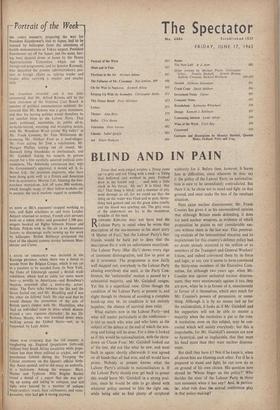— Portrait of the Week-1
MR. JAMES HAGERTY, preparing the way for President Eisenhower's visit to Japan, had to be rescued by helicopter from the attentions of hostile demonstrators at Tokyo airport. President Eisenhower set off for Japan, just the same, hav- ing been slapped down at home by the House Appropriations Committee which cut his foreign-aid programme, and by Senator Kennedy, who described the present administration's pos- ture in foreign affairs as talking louder and louder while carrying a smaller and smaller stick '
*
THE Guardian revealed, and it was later announced, that Mr. Alfred Robens will be the next chairman of the National Coal Board. A number of political commentators suddenly dis- covered that Mr. Robens was a great statesman, and that his leaving politics would therefore be yet another blow to the Labour Party. That party continued, meanwhile, its public all-in, no-holds-barred, wrestling and wrangling match, with Mr. Woodrow Wyatt crying 'Big bully!' at Mr. Frank Cousins; Sir Tom Williamson de- nouncing Mr. Michael Foot as a mud-slinger; Mr. Foot calling Sir Tom a totalitarian; Mr. Morgan Phillips lashing out all round; Mr. Shinwell firing broadsides at intellectuals; and Mr. Gaitskell licking his wounds in private except for a few carefully selected political com- mentators. The Admiralty announced that, with the Government's approval, it would sell S. G. Brawn Ltd., the precision engineers, who have been doing quite well to a British and American firm in association. Hoover Ltd., blaming the hire- purchase restrictions, laid off some 800 workers, which brought many of their fellow-workers out in protest: the stock markets sagged in sympathy.
ns SOON As BEA engineers' stopped working to rule, and flight schedules to and from London Airport returned to normal, French civil servants went on a token strike, and grounded 2,500 pas- sengers booked on flights between France and Britain. Pickets took to the air at an American factory to discourage scabs turning up for work by helicopter. British Railways postponed the start of the electric express service between Man- chester and Crewe.
*
A STATE OF EMERGENCY was declared in the Katanga province, where there was a threat to secede from the Belgian Congo, which is not yet in a position to be seceded from. In New York, the Duke of Edinburgh opened a British trade exhibition, which had to cable for more warm beer—a novelty to Americans—and Broadway's theatres reopened after a twelve-day actors' strike. The Paris talks between the Six and. the Seven fizzled out, and Mr. Maudling said it was the other six fellows' fault. He also said that he would discuss the promotion of the sale of British men's clothes with Mr. Macmillan, who 'had an individual taste in dress which demon- strated a very vigorous character.' So has Dr. Barbara Moore, who was knocked down while walking across the United States—not, as it happened, by Lady Attlee.
THERE WAS EVIDENCE that the old country is toughening up. England (population forty-odd million) beat South Africa (available white popu- lation less than three million) at cricket, and 'no guardsman fainted during the Trooping the Colour ceremony on the Queen's official birth- day. Ascot opened, and so did many an umbrella, in a hailstorm. Among the winners: Blast, Shatter and Typhoon. Mlle Brigitte Bardot issued a denial of a report that she was giv- ing up acting and taking to antiques, and sad sighs were heaved by a number of antique boulevardier,, roués, faux celibataires, and rasta- quotteres, who had got it wrong anyway.










































 Previous page
Previous page